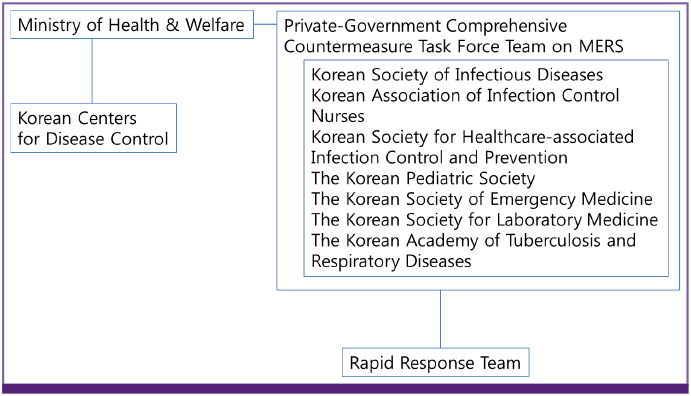Infect Chemother.
2015 Dec;47(4):247-251. 10.3947/ic.2015.47.4.247.
The Same Middle East Respiratory Syndrome-Coronavirus (MERS-CoV) yet Different Outbreak Patterns and Public Health Impacts on the Far East Expert Opinion from the Rapid Response Team of the Republic of Korea
- KMID: 2170502
- DOI: http://doi.org/10.3947/ic.2015.47.4.247
Abstract
- A Middle East Respiratory Syndrome-Coronavirus (MERS-CoV) outbreak, the largest outbreak outside the Middle East in 2012, occurred in the Republic of Korea and resulted in a large number of cases, with 186 infected people, including 38 deaths. A Rapid Response Team (RRT) was appointed after a request from the Korean government on June 8, 2015 calling for specialists to manage and control the MERS-CoV outbreak. This report presents the opinion of the RRT who worked to manage this healthcare-associated MERS-CoV outbreak in Korea.
MeSH Terms
Figure
Reference
-
1. World Health Organization (WHO). Middle East respiratory syndrome coronavirus (MERS-CoV)-Republic of Korea. Accessed 30 May 2015. Available at: http://www.who.int/csr/don/30-may-2015-mers-korea.2. Ben Embarek PK, Van Kerkhove MD. Middle East respiratory syndrome coronavirus (MERS-CoV): current situation 3 years after the virus was first identified. Wkly Epidemiol Rec. 2015; 90:245–250.3. Jun KW. How MERS could affect South Korea's economy. South Brunswick: The Wall Streeet Journal;2015. 06. 10. Accessed 20 July 2015. Available at: http://blogs.wsj.com/economics/2015/06/10/how-mers-could-affect-south-koreas-economy/.4. World Health Organization (WHO). WHO statement on the ninth meeting of the IHR Emergency Committee regarding MERS-CoV: WHO statement 17 June 2015. Accessed 20 July 2015. Available at: http://www.who.int/mediacentre/news/statements/2015/ihr-ec-mers/en/.5. Lloyd-Smith JO, Schreiber SJ, Kopp PE, Getz WM. Super-spreading and the effect of individual variation on disease emergence. Nature. 2005; 438:355–359.
Article6. Stein RA. Super-spreaders in infectious diseases. Int J Infect Dis. 2011; 15:e510–e513.
Article7. The Korean Society of Infectious Diseases, Korean Society for Healthcare-associated Infection Control and Prevention. An unexpected outbreak of Middle East respiratory syndrome coronavirus infection in the Republic of Korea, 2015. Infect Chemother. 2015; 47:120–122.8. Ministry of Health & Welfare. Korean MOH press release. [trans. Korean subscribers, edited]. Accessed 9 Jun 2015. Available at: http://www.mw.go.kr/front_new/al/sal0301vw.jsp?PAR_MENU_ID=04&MENU_ID=0403&page=1&CONT_SEQ=323205.9. Oboho IK, Tomczyk SM, Al-Asmari AM, Banjar AA, Al-Mugti H, Aloraini MS, Alkhaldi KZ, Almohammadi EL, Alraddadi BM, Gerber SI, Swerdlow DL, Watson JT, Madani TA. 2014 MERS-CoV outbreak in Jeddah-a link to health care facilities. N Engl J Med. 2015; 372:846–854.
Article10. World Health Organization (WHO). Summary and risk assessment of current situation in the republic of Korea and China: MERS-CoV risk assessment 19 June 2015. Accessed 20 July 2015. Available at: http://www.who.int/csr/disease/coronavirus_infections/risk-assessment-19june2015/en/.11. Jack A. Why the panic? South Korea's MERS response questioned. BMJ. 2015; 350:h3403.
Article12. Perl TM, Price CS. Orchestrated scientific collaboration: critical to the control of MERS-CoV. Ann Intern Med. 2015; 163:313–314.
Article
- Full Text Links
- Actions
-
Cited
- CITED
-
- Close
- Share
- Similar articles
-
- Costly Lessons From the 2015 Middle East Respiratory Syndrome Coronavirus Outbreak in Korea
- Middle East respiratory syndrome: what we learned from the 2015 outbreak in the Republic of Korea
- Collaborative Intervention of Middle East Respiratory Syndrome: Rapid Response Team
- Institutional Preparedness to Prevent Future Middle East Respiratory Syndrome Coronavirus-Like Outbreaks in Republic of Korea
- Middle East Respiratory Syndrome Coronavirus Infection in Children



